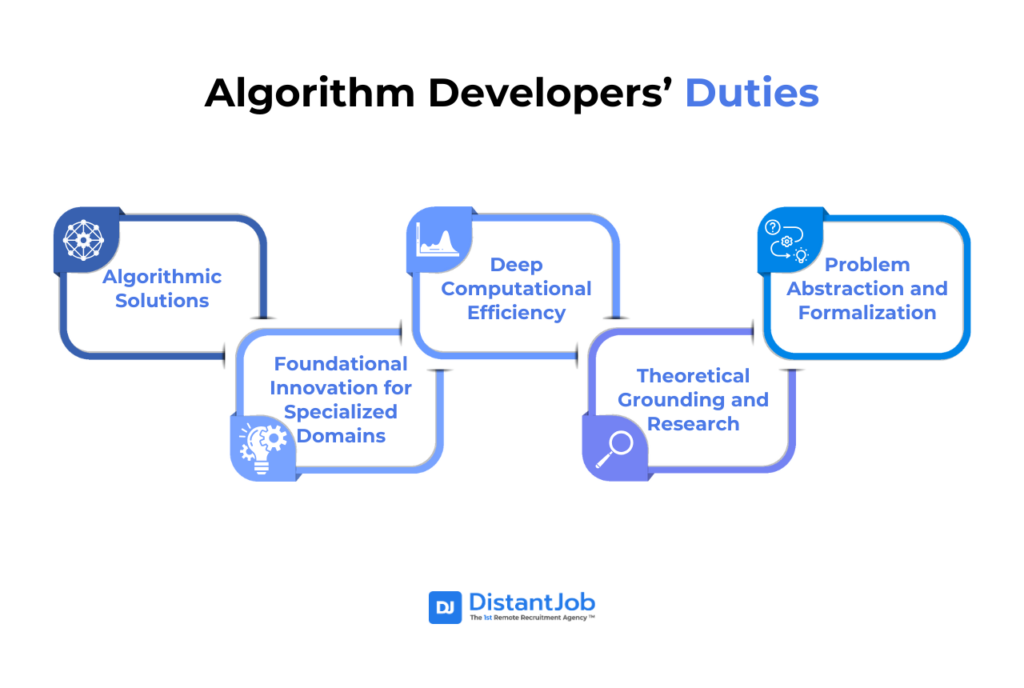Algorithms fuel our daily lives, powering technology from search results to products. They are like a cake recipe, a set of instructions towards a specific end goal. Algorithms engineers are responsible for writing these instructions in a way that a computer understands and executes them.
They design, develop, and implement algorithms, bridging the gap between algorithmic theory and practical software applications. There is a huge demand for this type of professional, with average salaries ranging from $120,000 to $200,000+ annually in the United States.
This article covers what algorithm developers are, how they differ from software developers, who uses their services, and the skills and education needed to become one. Finally, we will know why the industry always seeks more of them. Spoiler: they are vital.
What Is an Algorithm Developer?
An algorithm developer is a specialist focused on the development, testing, and implementation of algorithms (processes for solving problems or completing tasks). In other words, they are responsible for designing a solution to a problem. They employ mathematics and computer science, analyzing problem requirements, researching existing solutions, designing new algorithms, implementing them in code, and continuously optimizing performance.
They often work with large datasets and need to ensure their algorithms can scale to handle millions or billions of operations.
Unlike other developers who might work on user interfaces or system architecture, algorithm developers dive deep into the mathematical and logical foundations of how software processes information.
Algorithm Developers’ Duties

The responsibilities of an algorithm developer may vary widely by industry and project. Usually, they are responsible for tasks centered on problem-solving and code optimization. An Algorithm Developer discovers, invents, and optimizes algorithms, often at the theoretical or mathematical frontier of a problem. While a software engineer builds systems, or a senior developer implements best practices and mentorship, an Algorithm Developer’s unique value lies in their ability to:
1. Algorithmic Solutions
They try new approaches where existing solutions are inefficient, intractable, or non-existent. They understand computer science fundamentals, discrete math, and complexity theory to transform complex problems into efficient procedures. They don’t just implement algorithms; they create them from scratch or re-architect their underlying logic.
2. Deep Computational Efficiency
Any developer optimizes code; an Algorithm Developer dives deep into the complexity of a problem.
Let’s first understand what complexity is. In short, the more complex a problem is, the more variables it has. They eliminate algorithms’ inefficiency by adding or subtracting new algorithms. They reduce the fundamental computational cost of a task, often requiring breakthroughs in data structure design specifically tailored for the algorithm’s mechanics, rather than for general system architecture.
3. Problem Abstraction and Formalization
An algo engineer excels at abstracting real-world challenges into their mathematical and computational essence, identifying the core combinatorial, statistical, or graph-theoretic problems within. In short, they use magic to solve problems and call it math. Their “mathmagic” involves turning problem-solving into algorithmic specifications and then translating those into executable code.
4. Foundational Innovation for Specialized Domains
Algorithm developers are a must-have specialist in areas like AI, quantitative finance, scientific computing, or large-scale data processing. They might be responsible for designing the core search algorithms, optimization routines, numerical methods, or pattern recognition techniques. Their expertise helps a lot of other professionals, like Data Engineers, Data Scientists, or Machine Learning developers. Algorithm developers provide a highly optimized engine, often tailored for research, which leads us to.
5. Theoretical Grounding and Research
Continuous engagement with academic research is a must, and pushing the boundaries of what’s computationally possible, often contributing to or drawing directly from theoretical computer science. Their work frequently involves proving correctness, analyzing worst-case scenarios, and understanding the theoretical limits of a given computational approach.
Essential Skills for Algorithm Developers
To be a skilled algorithm developer, focus on computer science, discrete math, and linear algebra. You must be able to code, using programming languages that are commonly used for algorithms and mathematical processing, such as Python, C++, and Java. Here are the key technical skills:
Technical Skills
Programming Languages
- Python: Widely used for algorithm development, data analysis, and machine learning
- Java: Popular for enterprise applications and large-scale systems
- C++: Essential for high-performance computing and system-level programming
- JavaScript: Important for web-based algorithmic applications
- R: Valuable for statistical computing and data analysis
- Rust: It focuses on safety, speed, and concurrency, being memory safe with an automatic garbage collection.
- SQL: Crucial for database query optimization and data manipulation
Mathematical Foundation
- Discrete Mathematics: Logic, set theory, and combinatorics
- Big O Notation: Big O tells us how an algorithm’s performance scales with the size of its input. Imagine you’re searching for a name in a phone book. A simple search (O(n)) would take longer as the phone book grows.
- Statistics and Probability: Understanding distributions, hypothesis testing, and statistical inference
- Linear Algebra: Matrix operations, eigenvalues, and vector spaces
- Calculus: Optimization techniques and gradient-based methods
- Graph Theory: Network analysis and pathfinding algorithms
Data Structures and Algorithms
- Arrays, linked lists, stacks, queues, and hash tables
- Trees, heaps, and advanced tree data structures
- Graph algorithms (shortest path, minimum spanning tree, network flow)
- Sorting and searching algorithms
- Dynamic programming and greedy algorithms
- Divide-and-conquer techniques
- Time vs. Space Complexity
Specialized Knowledge
- Machine Learning: Supervised and unsupervised learning algorithms
- Artificial Intelligence: Neural networks, deep learning, and AI frameworks
- Database Systems: Query optimization and indexing strategies
- Distributed Computing: Parallel processing and distributed algorithms
- Cryptography: Security algorithms and encryption methods
Soft Skills
Algorithm engineers should also possess soft skills since they work with other developers, researchers, product managers, etc. They need to communicate with others and explain the logic of an algorithm to non-technical stakeholders.
Problem-solving is another key skill required of algorithm developers. Developing a new algorithm often requires a lot of trial and error to get it right. The job requires creativity and a curious mind since algorithm developers frequently have to think outside the box. They also need to be well-organized and manage their time well, as they will need to iteratively go through experiments and documentation.
Educational Background
Algorithm developers often have a degree in Computer Science, Computer Engineering, or Mathematics. These fields offer courses in algorithms. Many developers have more advanced degrees (master’s degree or PhD), more commonly in specialized roles (e.g., machine learning, robotics, and computer vision).
However, a degree is not mandatory. Many developers are self-taught or have completed online courses related to algorithm development. So, a degree is not mandatory to become a skilled algorithm engineer. What is important is that algorithm developers demonstrate their expertise and understanding of algorithms.
Algorithm Developers Career Paths
There are several types of algorithm engineers, from Machine learning to search engine algorithms.
Machine Learning Algorithm Developer
Focuses on creating and optimizing ML algorithms for applications like recommendation systems, computer vision, and natural language processing. Average salary: $140,000-$220,000.
Financial Algorithm Developer (Quantitative Developer)
Develops trading algorithms, risk management systems, and financial modeling tools for banks, hedge funds, and fintech companies. Average salary: $150,000-$300,000.
Search Algorithm Developer
Works on search engines, information retrieval systems, and ranking algorithms for companies like Google, Microsoft, and Amazon. Average salary: $130,000-$200,000.
Graphics Algorithm Developer
Creates algorithms for computer graphics, game engines, and visual effects in the entertainment and gaming industries. Average salary: $120,000-$180,000.
Optimization Algorithm Developer
Specializes in operations research, supply chain optimization, and resource allocation problems for logistics and manufacturing companies. Average salary: $125,000-$190,000.
Algorithm Engineer vs. General Software Developer
The difference between algorithm developers and software developers is that software developers write code, while algorithm developers go beyond coding to design, optimize, and fine-tune the underlying logic that powers high-performance systems. They are problem-solving specialists who create the “brain” of software applications.
While software engineers build complete systems (user interfaces, databases, servers), algorithm engineers focus specifically on the decision-making logic that powers these systems.. An algorithm developer works on designing and implementing algorithms and is focused on solving a problem.
Here’s a table of comparison to showcase the difference between an algorithm engineer, a software developer, a ML engineer, a data scientist, and an embedded system engineer.
| Role | Core Focus | Key Responsibilities | Typical Industries | Key Skills | Overlaps With |
| Algorithm Developer | Designing and optimizing algorithms for performance and efficiency | – Design and implement algorithms (search, optimization, ML, etc.) – Analyze computational complexity – Tailor algorithms to hardware/software constraints | Tech, Finance, AI, Robotics, Defense | – Data structures – Complexity analysis – Math (Discrete, Linear Algebra) – C++, Python, MATLAB | Data Scientist, ML Engineer, Research Scientist |
| Software Developer | Building software applications | – Write code to implement features – Debug and maintain applications – Integrate APIs and databases | All industries | -Programming (Java, Python, JS) – Version control -Problem-solving | Backend Developer, DevOps |
| Machine Learning Engineer | Applying algorithms to build predictive models | – Train, validate, and deploy ML models – Preprocess data – Use ML libraries (TensorFlow, PyTorch) | AI, FinTech, HealthTech | – ML theory – Data pipelines – Python, SQL- Cloud platforms | Data Scientist, Algorithm Dev |
| Data Scientist | Extracting insights from data using statistical methods | – Data analysis and visualization – Model building -Business-oriented recommendations | Marketing, Healthcare, Retail, Tech | – Statistics – SQL, R, Python -Communication skills | ML Engineer, Analyst |
| Research Scientist (AI/CS) | Theoretical exploration and innovation in algorithm design | – Publish papers – Design new algorithmic approaches – Collaborate with academia | Academia, R&D, DeepTech | -Theory-heavy knowledge – Innovation focus – Publications | Algorithm Dev, ML Engineer |
| Embedded Systems Engineer | Implementing algorithms on constrained hardware | – Optimize algorithms for memory/CPU – Work with firmware and real-time systems | Automotive, IoT, Aerospace | – C/C++ – Low-level debugging – RTOS knowledge | Algorithm Dev, Hardware Eng |
| Quantitative Analyst (Quant) | Using mathematical models for financial predictions | – Design trading algorithms – Backtesting and performance tuning – Risk modeling | Finance, Hedge Funds | – Statistics – C++, Python – Financial math | Algorithm Dev, Data Scientist |
What is the salary of an algorithm engineer in the U.S.?
Compensation for algorithm developers is high due to the skill set and solutions they produce. The salaries vary based on location, experience, and industry. In the U.S., the average salary is in the range of low to mid-six figures. According to Glassdoor, the total compensation of $197,000, which includes base compensation of $120,000 plus additional bonuses.
This is consistent with other salary surveys, such as a PayScale report of $109,000 from 2021.
In 2020, the U.S. Bureau of Labor Statistics reported a mean salary of $126,830 for related roles (computer and information research scientists/algorithm developers), with $145,920 for software publishers and $140,000 for research and development positions.
Disparities are most likely due to different employee pools and timing. However, the salary of algorithm developers in the US is in the six-figure range.
Conclusion
Algorithm developers are a mix of mathematicians, computer scientists, and problem-solvers. They have the skills and experience that companies will need as they start to leverage algorithms.
To become a successful algorithm developer, you must have technical knowledge, a willingness to learn, build a portfolio of projects, and the ability to translate math into code.
And if you are on the other side, looking to hire a talented algorithm engineer, we can help. We can do the sourcing, hiring, and managing for you, all in less than a week. Book a free consultation now to learn more.





